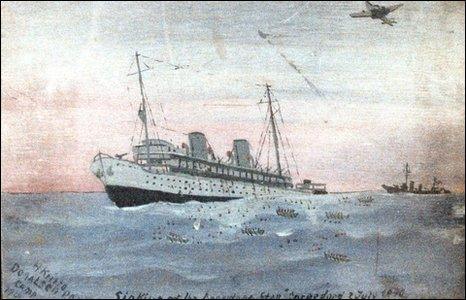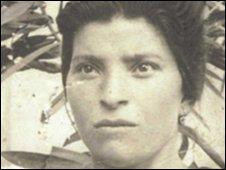Your stories: Italian internment
- Published
It was 70 years ago, 10 June 1940, that Italy declared war on the Allies sparking the internment of many Italians living in Scotland.
BBC Scotland news website readers shared some of their memories and family stories of that day and its repercussions.
Roderick Owens, Aberdeen

Many Italians and people of other nationalities lost their lives on the Arandora Star which was sunk by a U-boat on 2 July 1940
My late father Roderick Reid Owens was a guard on the Arandora Star when it was torpedoed. He was one of the survivors.
I believe that he was in the sea for many hours. He never could swim, so it is a wonder he survived.
My father ingested a large quantity of oil when in the sea. As a result, he developed duodenal ulceration and was operated on shortly after his return to Britain. He had very painful trouble with his digestive system for the rest of his life.
I have a painting of the sinking of the Arandora Star. It was painted by a German survivor at 'Donalsen POW Camp' (Donaldson's Hospital, Edinburgh) in 1941.
The painting was given to my father, then a camp guard. It may be the only eyewitness record of the tragedy.
Linda Baldi, Salerno
My grandparents from La Spezia owned a cafe in Kilmacolm. During the war my grandfather was sent to the Isle of Man and my grandmother to Glasgow.
Despite being born in Scotland dad wasn't allowed to continue his studies and was sent to do manual labour on a local farm. He and his sister had to run the cafe between them as best they could.
They had no problems with the locals at all, after all they had grown up with them, gone to school with them and are still friends with some of them today.
Dad never complained about being mistreated during the war years, his only regret was that he never managed to complete his studies.
He set up business in Glasgow, Dino's and Ferrari's in Buchanan Street and Sauchiehall Street. On the other hand, growing up in the 60s and 70s, I suffered a few snide remarks about the Tallies.
Krys Inglis, Irvine
My grandfather and eldest uncle who were born in Italy were interned on the Isle of Man.
My two younger uncles, both born in Scotland, went to war and were both posted to Italy, one with the Highland Light Infantry and the other with the Gordon Highlanders. They bumped into each other in a street in Palermo late in the war.
My grandparents house in the Gorbals had windows broken and my grandmother, mother and an aunt were verbally abused.
When I was born in 1947 and we lived in the Gorbals I was always known as "the Tally's wean" - something to be proud of according to my Scottish father, and he was right.
Brian Steel, Cupar

Anna Esposito came to Dundee from Amalfi in the early 1920s
My grandparents, Lorenzo and Anna Esposito, came over from Amalfi in Italy in the early 1920s and settled in Dundee and had four children, including my mother.
My grandfather firstly owned and later worked as an employee in fish and chip shops in the Hilltown area of the city. He was never a supporter of the Fascist party. Indeed, he refused to contribute to the collection organised by the local black shirts to help finance the war in Ethiopia.
On hearing the news that Italy declared war on the radio, my grandfather announced to the family that the police would be coming for him. They arrived shortly afterwards and he was taken to the Isle of Man.
Marie Hermiston, Edinburgh
My story is probably a bit fragmented but from what I remember of the stories told, the head of my gran's family was Dominic Margiotta.
He was married to Maria D'Placido and they had a large family of nine. Three of their sons served during the war for Britain and all perished.
As a migrant from Naples, Dominic Margiotta was selected to be deported on the Arandora Star. He was one of the fortunate survivors.
There were others deported along with him, some of whom weren't fortunate enough to survive, one of these was a gentleman named Pelosi.
Other families from the Grassmarket in and around this time were Visco, Fusco, D'Angelo, Peruzzi, Tomassi and Crolla, Angeluci, Pappa to name a few. But there were no known repercussions from Mussolini joining the war. The Grassmarket was full of Irish, Polish and Italian immigrants.
The name Margiotta is fairly common in Edinburgh now as a great many of his family went on to own a chain of local shops. The Crolla family branched out into chip shops and restaurants.
Antony Visocchi, New Jersey
My father was a British subject and was not interned but that did not stop a mob from smashing the plate glass windows of his cafe in Leven.
All of my uncles were sent to camps in the Isle of Man, Canada and Australia. One died in the Arandora Star.
They were taken away in the dead of night by the police, thrown in prison and were permitted no visitors. Their wives and children were made to move to camps inland away from the coast.
Although they had to close down their businesses and were deprived of income, they still had to pay the rent, mortgages and upkeep of the buildings.
The memory of these events led to a deep distrust and particular dislike - to be diplomatic - of Churchill.
- Published10 June 2010
- Published10 June 2010